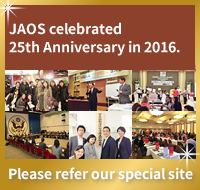Activity report
2024 | 2023 | 2022 | 2021 | 2020 | 2019 | 2018 | 2017 | 2016 | 2015 | 2014 | 2013 | 2010 | 2009 | 2008 | 2007 | 2006 | 2005 | 2004 | 2003 | 2002 | 2001 |2010 JAOS Autumn General Meeting
December 9, 2010
at Shibuya Forum 8 in Tokyo
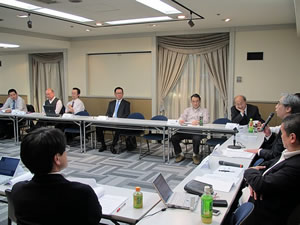
32 participants, representing 26 JAOS member organizations (14 of which were present by proxy) attended the JAOS Autumn General Meeting. Each task team provided updates on their activities and laid out their upcoming plans. Importantly, with the cooperation of the Consumer Agency, CIEL (Council of International Education and Language Travel, Japan) and Ryukgaku Kyokai, task teams reported their progress regarding the provisionally-titled ‘Overseas Study Service Review’. This focuses on the societal repercussions of bankruptcies and similar problems involving study abroad businesses. It was announced that within the fiscal year, a plan should be implemented that creates an approved mechanism (criteria and framework) for financial screening. A lively discussion ensued. Moreover, our Administrative Office affirmed our participation in the the ‘Global Japan Initiative Project’. As the velocity of globalization continues to increase, from all quarters, we have received a variety of proposals regarding the stimulation of outbound study abroad activities. However, it is only the ‘GJI Project’ that aims to become a functionary platform for increasing outbound students, formulate a study abroad strategy for all of Japan, activate the study abroad industry and widen the market. In addition, this project has resolved to include members from outside of JAOS. In other business, the ‘JapaNext project’ that JAOS approved in the spring of 2010 has continued to take form. This fiscal year, it has been officially confirmed that three advisory committees based on the 3 pillars of study abroad will be set in place: the ‘Outbound Study Abroad’ Committee, the ‘Inbound Study Abroad’ Committee and the ‘Job Support’ Committee (Job support for international students). Lastly, next year (2011) marks the 20th anniversary of JAOS’ foundation. To commemorate the occasion, JAOS has decided to create a ’20th Anniversary Special Event Committee’.
U.S. Study Abroad Seminar – Sponsored by the U.S. Embassy and JAOS
November 12, 2010 at the Fukuoka Prefectural Center for International Exchange November 19, 2010 at the Naha City Public Welfare Center
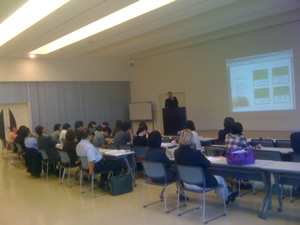
Based on the same series of seminars conducted in Sapporo, Sendai and Niigata in September, these events were titled, ‘Overseas Study in the U.S. as Career Design’ (Raising awareness of how global human resource development and overseas university studies/high school and university exchanges are an aspect of ‘career design’.). These two seminars were enhanced by the additional inclusion of Ms. Hitomi Okazaki (Editor of Rikunabi for Recruit Co. Ltd.). 17 people participated in the Fukuoka seminar while 24 joined the Naha event. One high school vice-principal present at the Fukuoka event stated, “Regarding globalization, I think the ‘Black Ships’ (ref. Matthew Perry) have finally arrived for Japanese university students. High school guidance counseling must now change.” This statement echoes the main purpose of this seminar. If more teachers don’t take a similar stance, it will be difficult for Japan to change. Such words demonstrate the meaning of JAOS-led activities.
U.S. Study Abroad Seminar – Sponsored by the U.S. Embassy and JAOS
September 22, 2010 at Asty 45 in Sapporo September 27, 2010 at the Sendai Metropolitan Hotel September 28, 2010 at the Chisun Hotel in Niigata
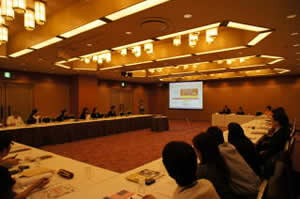
This Study abroad seminar, titled ‘Human Resource Development for a Global World and Study Abroad’ was supported by the Japanese Ministry of Economy, Trade and Industry, Fulbright Japan (Japan U.S. Educational Committee) and the Japan Youth Development Association. It primarily targeted high school instructors in Japan. The overriding theme of the seminar was how Japan can meet the increasing demands of globalization and societal transformation by having high school teachers show students that studying at American universities is one more option for their future. In addition to keynote speeches, the seminar format allowed for a panel discussion. The first speech, titled ‘The Globalization of Japan’s Economic Development Strategy and Industrial Human Resource Development Policy’, was provided by Mr. Koji Ono (Assistant Chief of the Office of Industrial Human Resource Policy, Economic and Industrial Policy Bureau, Ministry of Economy, Trade and Industry). The second lecture, titled ‘The Merits of American Universities’, was provided by Mr. Masayasu Morita (President of Hitomedia and author of ‘Todai yori, Habado ni Iko’ [‘Forget Tokyo U., Let’s go to Harvard’]). The panel discussion was titled, ‘Global Human Resource Development and Overseas Study’. Panelists included Mr. Ono, Mr. Morita and Ms. Atsuko Ichikawa (Study Abroad Adviser at Fulbright Japan [Japan-U.S. Educational Committee]). In addition, Mr. Ryuki Hayashi (Secretary-General of JAOS) acted as commentator while Ms. Yoshiko Fujinobe (President of JACSAC [Japan Association of Certified Study Abroad Counselors]) took on the role of moderator. The panelists fielded a variety of questions from the floor and debated topics such as Japanese university entrance examinations and studying at U.S. institutions of higher learning. At the Sapporo event, Mr. Thomas H. Lyons (Consul at the U.S. Consulate General in Sapporo) provided a speech. 14 participants attended the Sapporo event, while 28 and 16 people joined the Sendai and Niigata events, respectively.
JAOS Member Visit to Irish Universities and Language Schools – Sponsored by the Embassy of Ireland and JAOS
September 8-14, 2010
in Ireland
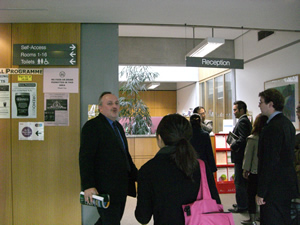
In order to increase overseas study activities in Ireland, the Irish Embassy funded this educational visit to Irish schools. Five JAOS organizations participated. Through several 2-hour seminars held at the Irish embassy in July and August, followed by an actual trip to Dublin and Limerick Universities and language schools, JAOS representatives were able to meet with school representatives and increase their knowledge of educational opportunities in Ireland.
2010 JAOS Spring General Meeting
June 25, 2010
at Shibuya Forum 8 in Tokyo
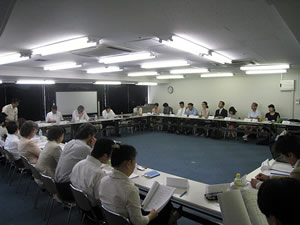
45 participants, representing 31 JAOS member organizations (9 of which were present by proxy) attended the 2010 JAOS Spring General Meeting. 2009 financial accounts were settled while budget proposals for the 2010 fiscal year were ratified. Each task team reported on their activities during the first half of 2009 and announced their plans for the final 6 months of 2010. After being nominated by the administrative board, 3 new members were confirmed to the board: Mr. Minoru Yamada (Global Partners), Ms. Yukari Kato (Ryugaku Journal) and Mr. Ryutaro Sato (JTB Gaiareku). Moreover, the following JAOS council positions were also nominated and accepted. ♦ JAPANext Project Advisory Committee This project involves expanding instruction and support activities in order to help the next generation of young people to utilize ‘overseas study’ in building their careers. More simply, it hopes to enlarge the prospect of studying abroad. Within the government’s ‘New Strategy for Growth’, a goal of “Sending 300,000 Japanese students overseas for study and research exchange while welcoming 300,000 quality overseas students into Japan. ” has been put in place. With this in mind, the committee will work together with industry, academia and the government to develop an action plan for increasing the number of people taking part in overseas study. ♦ ‘Overseas Study Language Ability’ Research and Advisory Committee For improving the language ability of Japanese study abroad candidates, constructing and popularizing a support system (‘study abroad English’, ‘study abroad Chinese’, etc.) is an urgent issue. This committee will gather recommendations and research on how this area is progressing. ♦ ‘Inbound Study Abroad’ Promotion Committee FELCA’s worldwide network, of which JAOS is a part, includes an infrastructure that can possibly contribute to Japan’s “Project for Increasing Inbound Students”. This committee will consider how to advance the government’s agenda of ‘Hosting 300,000 Overseas Students’ by making best use of FELCA and other measures. These activities will also help to create a new market for JAOS membership organizations. ♦ ‘International Student Employment’ Support Committee This committee will investigate and promote ways of supporting the employment efforts of Japanese students returning from overseas study as well as foreign students currently residing in Japan.
Briefing Session Hosted by JAOS / JAFSA (Japan Network for International Education) – ‘Industry-Academia Joint Commission on Developing Global Human Resources’
June 23, 2010
at Waseda University in Tokyo
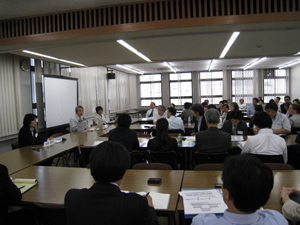
Called in to lead the briefing session were Mr. Yasuaki Uchino (Assistant Chief of the Office of Industrial Human Resource Policy, Economic and Industrial Policy Bureau, Ministry of Economy, Trade and Industry), Mr. Mitsuhide Shiraki (Professor at Waseda University’s School of Political Economy Studies) and Ms. Yuko Miyata (Director of Human Resources at Unilever Japan Holdings KK). Not including the speakers and host organizations, 63 participants were present (including representatives of universities, language schools, and other study abroad-related organizations). The briefing centered around the report collected in April regarding the proposed ‘Industry-Academia Joint Commission on Developing Global Human Resources’, which the Ministry of Economy, Trade and Industry’s Office of Industrial Human Resource Policy and Ministry of Education, Science, Sports and Culture’s Higher Education Bureau began investigating in November of 2009. Considering the rapid changes that accompanies globalization as well as the current state of the Japanese economy, it can be said that the seminar was extremely beneficial, considering it made us ponder the important question, “How should universities handle career guidance and employment support?”
8th JAOS Certified Counselor Training Course Screening Seminar and Certification Test
June 12-13, 2010
at ALC Event Hall in Tokyo
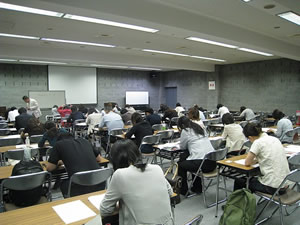
The 8th ‘JAOS Certified Counselor Training Course’ which includes a screening seminar and certification test, were held over a two-day period. The event was sponsored by JAOS and administered by ALC Press. 5 instructors led the course. In addition to a workshop, extremely vigorous screening seminar, and hour-long paper test, participants took part in evaluated group presentations. Candidates will learn if they have successfully qualified by the end of July.
U.S.A. Study Abroad Seminar – Sponsored by the U.S. Embassy and JAOS
March 2, 2010 at Tokyo American Center March 9, 2010 at Kansai American Center in Osaka
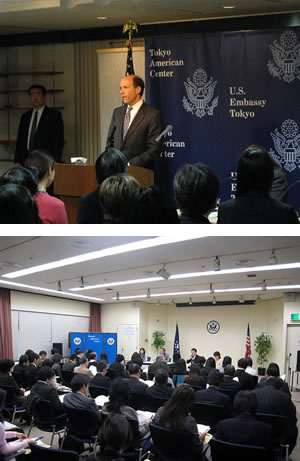
With support from Fulbright Japan (Japan-U.S. Educational Committee) and the Benesse Corporation, a seminar titled ‘Applying to Universities in Both Japan and America – The Possibilities and Methods of U.S. Higher Education’, was chiefly held for the benefit of senior high school instructors. The general point of the seminar was how Japan cat meet the demands of globalization by having high school teachers show students that studying at American universities is one more option for their future. The event included keynote lectures as well as a panel discussion. The first keynote speech, by Mr. Masanori Fujii (Benesse Corporation, Director of ‘Route H’) was titled ‘Current Entrance Trends at Japanese Universities and How to Apply to Universities in both Japan and the U.S.’, while the second lecture, titled ‘The Merits of American Universities’, was provided by Mr. Masayasu Morita (President of Hitomedia and author of ‘Todai yori, Habado ni Iko’ [‘Forget Tokyo U., Let’s go to Harvard’]). The panel discussion was titled ‘Considering Applying to Both Japanese and U.S. Universities’. Panelists included keynote speakers Mr. Fujii and Mr. Morita as well as Chizuru Sasada (Senior Counselor at Fulbright Japan [Japan-U.S Educational Committee]). Moderated by Yoshiko Fujinobe (President of JACSAC [Japan Association of Certified Study Abroad Counselors]), the panelists fielded a variety of questions from the floor and debated topics such as Japanese university entrance examinations and studying at U.S. institutions of higher learning. U.S. ambassador to Japan, Mr. John V. Roos, made a notable appearance and spoke for 40 minutes through a translator on the importance of educational exchange between Japan and America. 110 people participated in the Tokyo seminar while 60 joined the Osaka event.
JACSAC Seminar: ‘Basic Coaching Skills for Study Abroad Counseling’
February 25, 2010
at Wish International in Shinjuku, Tokyo
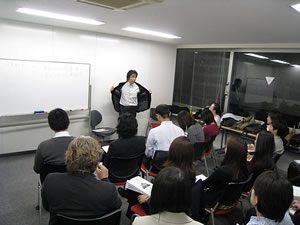
This seminar sponsored by JACSAC (Japan Association of Certified Study Abroad Counselors) was based on the theme, ‘Basic Coaching Skills for Study Abroad Counseling’. Led by Mr. Hideki Oyama, a research fellow at JYDA (Japan Youth Development Association), the seminar focused on the important coaching skill of ‘asking questions’. Along with the lecture was a chance for participants to actually practice the techniques introduced by splitting into pairs and practicing asking each other questions. Having a chance to get real-life experience, the seminar was greatly appreciated by the 18 participants.
2009 Fiscal Year 12th Annual JAOS-FGER Meeting
February 12, 2010
at AIG Training Center in Kinshicho
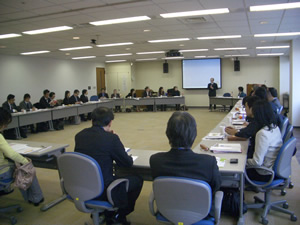
For the 13th time, JAOS and FGER (Foreign Government Educational Representatives) met for a lively exchange of information. Both sides presented their sides of the study abroad equation and discussed study abroad trends. This year, the meeting took a new approach, with JAOS presenting results from the 2nd survey (conducted in the autumn of 2009) done in collaboration with FELCA (Federation of Education and Language Consultant Associations) and GAELA (Global Alliance of Education and Language Associations) member organizations. FELCA is a London-based international association made up of about 1,000 study abroad industry organizations while GAELA represents about 2,000 language schools through national language school associations. This world-scale survey is groundbreaking in that it is the first to combine information from both agencies (FELCA) and schools (GAELA). As a first attempt, the results of this survey were unable to clearly confirm detailed market trends due to things such as a lack of survey items and sample size. However, the shear amount data does give us a great reference for understanding general international study abroad trends. Through this research, we were able to confirm our assertion that the current outbound situation in Japan is rather grim. By comparing 2008 figures recently released by the Japanese Ministry of Education, Culture, Sports, Science and Technology with those from a similar survey done in 2006, it has also come to our attention that the number of Japanese high schoolers studying abroad for more than three months has declined by 20% in 2 years. To address this, the embassies of various nations offered opinions regarding cooperative activities that might help invigorate the Japanese outbound study abroad market. For example, the Ireland Governmental Bureau for Business Affairs proposed that an educational tour of Ireland be organized for JAOS member organizations. In total 53 individuals attended the meeting, including 40 participants from 30 different JAOS member organizations, 12 representatives from FGER bodies (U.S. Embassy, Japan-U.S. Educational Committee, Australian Governmental Organization for International Education, Ireland Governmental Bureau for Business Affairs, British Council, Canadian Embassy) and one observer.


